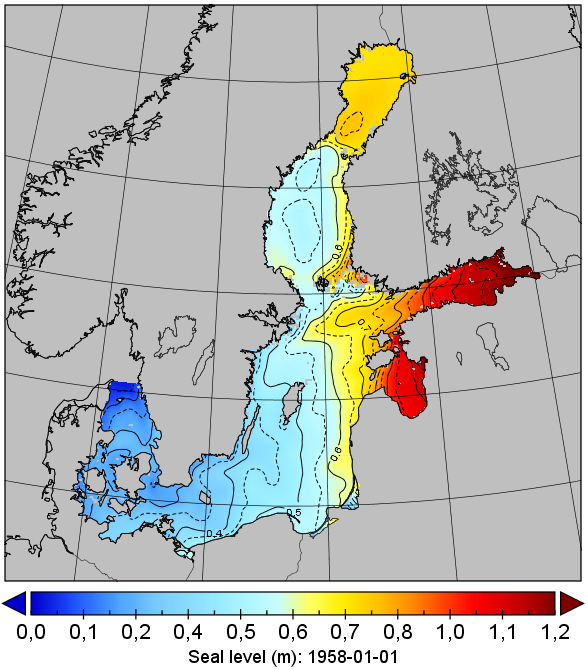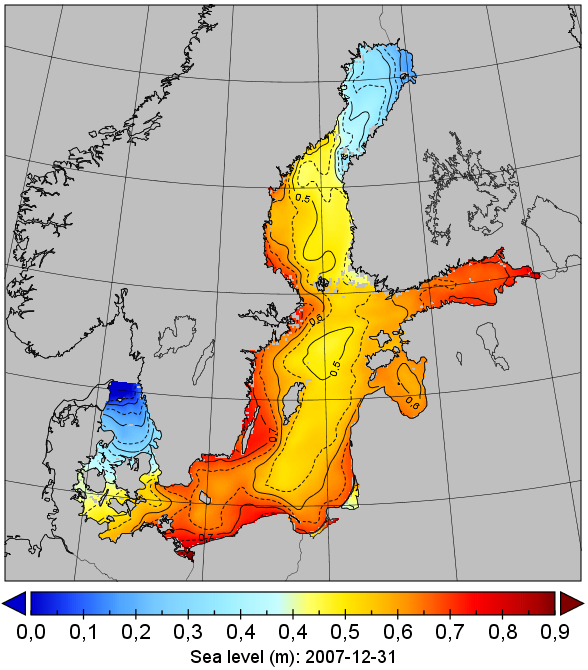Opis
The dataset contains the results of numerical modelling of sea level fluctuations over a period of 50 years (1958-2007) in the Baltic Sea (Jędrasik and Kowalewski, 2019). A long-term hindcast simulation was performed using a three-dimensional hydrodynamic model PM3D (Kowalewski and Kowalewska-Kalkowska, 2017), a new version of the M3D model (Kowalewski, 1997).
The model is based on the Princeton Ocean Model (POM) developed at Princeton University (Blumberg and Mellor, 1987). Like POM, the M3D/PM3D model uses the Mellor-Yamada turbulence scheme and sigma vertical coordinates. The simulation was carried out in a rectangular grid of 3' (latitude) and 6' (longitude) resolution. The spatial resolution was 3 nautical miles, i.e. about 5.5 km. An open boundary was located between the Skagerrak and the Kattegat along the parallel connecting Skagen and Göteborg, where the water exchange with the North Sea takes place. A radiation condition based on Somerfield’s concept for velocities vertically averaged and normal to the boarder plane was applied. Atmospheric forcing for the period 1958-2007 was performed using the regional at amospheric climate model REMO (REgional MOdel) which was based on the numerical weather prediction model EM (Europa-Model) of the German Weather Forecast Service (DWD).
The sea level spatial distributions were recorded in the model's computational grid in unprojected form (LatLong, WGS 84, EPSG: 4326) with an hourly time interval. Sea level values are expressed in metres relative to the mean level of the Baltic Sea in the PM3D model. The validation of the sea level modeling results for the period 2010-2015 showed (Kowalewski and Kowalewska-Kalkowska, 2017) a root mean square error (RMSE) of 8 to 13 cm for various stations in the Baltic Sea.
Kowalewski M.;1997; A three-dimensional, hydrodynamic model of the Gulf of Gdańsk; Oceanol. Stud., 26 (4); 77–98
Kowalewski M., Kowalewska-Kalkowska H., 2017, Sensitivity of the Baltic Sea level prediction to spatial model resolution, Journal of Marine Systems 173, 101–113, http://dx.doi.org/10.1016/j.jmarsys.2017.05.001
Jędrasik J., Kowalewski M., 2019, Mean annual and seasonal circulation patterns and long-term variability of currents in the Baltic Sea, J. Mar. Syst., 193, 1-26, doi:10.1016/j.jmarsys.2018.12.011


Plik z danymi badawczymi
hexmd5(md5(part1)+md5(part2)+...)-{parts_count} gdzie pojedyncza część pliku jest wielkości 512 MBPrzykładowy skrypt do wyliczenia:
https://github.com/antespi/s3md5
Informacje szczegółowe o pliku
- Licencja:
-
otwiera się w nowej karcie
CC BY-NC-SAUżycie niekomercyjne - Na tych samych warunkach - Oprogramowanie:
- Software for Manipulating or Displaying NetCDF Data
Informacje szczegółowe
- Rok publikacji:
- 2019
- Data zatwierdzenia:
- 2020-12-17
- Data wytworzenia:
- 2017
- Język danych badawczych:
- angielski
- DOI:
- Identyfikator DOI 10.34808/j1v9-ak44 otwiera się w nowej karcie
- Seria:
- Weryfikacja:
- Politechnika Gdańska
Słowa kluczowe
Powiązane zasoby
- publikacja Mean annual and seasonal circulation patterns and long-term variability of currents in the Baltic Sea
- publikacja Sensitivity of the Baltic Sea level prediction to spatial model resolution
- publikacja A three-dimensional, hydrodynamic model of the Gulf of Gdańsk
- publikacja 44 Years Hindcast of the sea level and circulation in the Baltic Sea
- dane badawcze Long-term hindcast simulation of water temperature and salinity in the Baltic Sea
- dane badawcze Long-term hindcast simulation of currents in the Baltic Sea
- dane badawcze Long-term hindcast simulation of currents in the Baltic Sea
Cytuj jako
Autorzy
Wersja ten dokument posiada różne wersje
-
wersja 2.1Data publikacji wersji 2021-04-07
-
wersja 2.0Data publikacji wersji 2021-03-29
-
Aktualna wersjawersja 1.0Data publikacji wersji 2020-12-17
wyświetlono 325 razy

